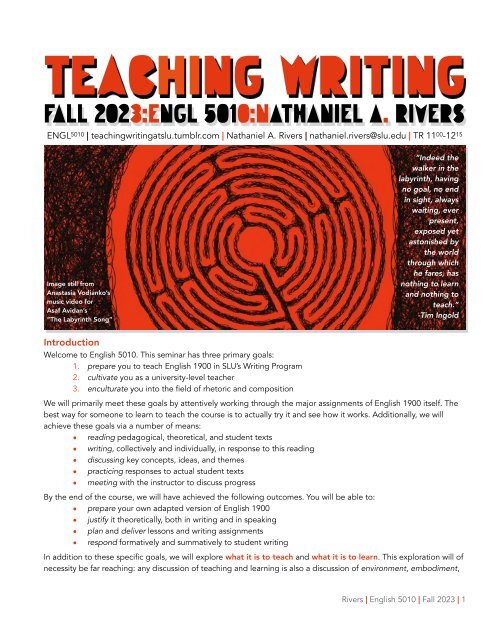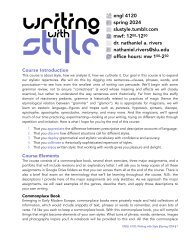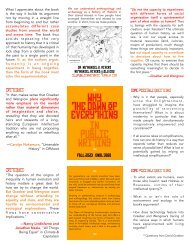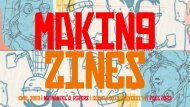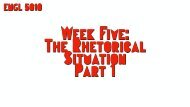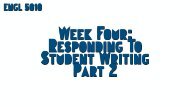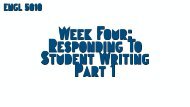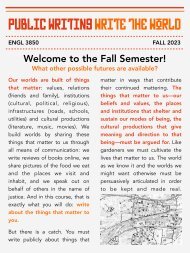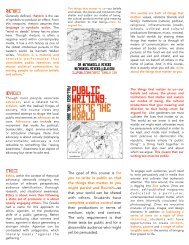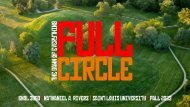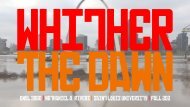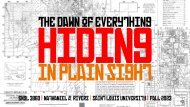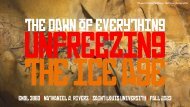ENGL 5010 Syllabus (FA23)
Create successful ePaper yourself
Turn your PDF publications into a flip-book with our unique Google optimized e-Paper software.
teaching writing<br />
FALL 2023:<strong>ENGL</strong> <strong>5010</strong>:NATHANIEL A. RIVERS <br />
<strong>ENGL</strong> <strong>5010</strong> | teachingwritingatslu.tumblr.com | Nathaniel A. Rivers | nathaniel.rivers@slu.edu | TR 11 00 -12 15<br />
Image still from <br />
Anastasia Vodianko’s <br />
music video for <br />
Asaf Avidan’s <br />
“The Labyrinth Song”<br />
“Indeed the<br />
walker in the<br />
labyrinth, having<br />
no goal, no end<br />
in sight, always<br />
waiting, ever<br />
present,<br />
exposed yet<br />
astonished by<br />
the world<br />
through which<br />
he fares, has<br />
nothing to learn<br />
and nothing to<br />
teach.” <br />
-Tim Ingold<br />
Introduction<br />
Welcome to English <strong>5010</strong>. This seminar has three primary goals:<br />
1. prepare you to teach English 1900 in SLU’s Writing Program<br />
2. cultivate you as a university-level teacher<br />
3. enculturate you into the field of rhetoric and composition <br />
We will primarily meet these goals by attentively working through the major assignments of English 1900 itself. The<br />
best way for someone to learn to teach the course is to actually try it and see how it works. Additionally, we will<br />
achieve these goals via a number of means: <br />
• reading pedagogical, theoretical, and student texts<br />
• writing, collectively and individually, in response to this reading<br />
• discussing key concepts, ideas, and themes<br />
• practicing responses to actual student texts<br />
• meeting with the instructor to discuss progress<br />
By the end of the course, we will have achieved the following outcomes. You will be able to: <br />
• prepare your own adapted version of English 1900<br />
• justify it theoretically, both in writing and in speaking <br />
• plan and deliver lessons and writing assignments<br />
• respond formatively and summatively to student writing<br />
In addition to these specific goals, we will explore what it is to teach and what it is to learn. This exploration will of<br />
necessity be far reaching: any discussion of teaching and learning is also a discussion of environment, embodiment,<br />
Rivers | English <strong>5010</strong> | Fall 2023 | 1
and cognition. Sociality and identity are also present and at stake here. How do we come to know both our worlds<br />
and ourselves? How can we come to help others know themselves and their worlds? There is, then, a profound<br />
ethical component to teaching. The word educate, etymologically, means to lead out, to draw out, to bring forth. We<br />
will thus ask to where are we leading them, what are we drawing out, and who are we bringing forth?<br />
Course Texts<br />
• The Animal Who Writes by Marilyn Cooper <br />
• Antiracist Writing Assessment Ecologies: Teaching and Assessing Writing for a Socially Just Future by Asao<br />
B. Inoue [Free Online]<br />
Additional readings and documents are shared via our Google Drive folder.<br />
Course Elements<br />
Social Annotation & Participation<br />
We cultivate and collect our thoughts on course readings using Hypothes.is, an online annotation application.<br />
Annotations vary from person-to-person, but our overriding goal is to share reactions, questions, interests, and dis/<br />
beliefs through annotating our readings together. Annotations take the form of comments, questions, intra- and<br />
inter-connections, and links. Annotations, crucially, add to the readings—they set them in motion.<br />
Research Binder<br />
At the conclusion of this course, you will submit a research binder. This binder will include every piece of paper you<br />
generate over the course of the semester. The binder is thus an archive. As an archive, it should have an<br />
organizational scheme that makes it accessible to both you and your instructor. Individual entries should be dated<br />
and described (e.g., quiz, reading-journal, notes, etc.). In addition to labeling individual entries, the binder itself<br />
should be organized in a coherent, compelling and accessible way. As an archive, it should trace the work of<br />
cultivating yourself as a teacher. Your binder should archive the following items:<br />
1. In-class Writing/Take-Home Assignments: Occasionally, you will be asked to write in class, and<br />
sometimes you’ll be asked to do short writing assignments at home.<br />
2. In-Class Notes: Follow this format for your in class-notes, using the affordances of your double-docket<br />
legal pad or GoogleDoc. This format requires you to annotate your own notes as one might annotate<br />
readings. These annotations serve both a formative and an archival purpose.<br />
Annotations (after class)<br />
What Aristotle means is that the<br />
rhetorician can see how people might<br />
think through possibilities specific<br />
situation. <br />
Every situation is different, a different<br />
context and a different audience. So<br />
the way you talk about something will<br />
be different in those different<br />
situations. Rhetoric doesnt deal with<br />
universal problems…it deals with<br />
specific problems.<br />
I have to ask about this tomorrow!!!<br />
August 28, 2019<br />
Notes (in class)<br />
Available Means: Rhetoric is the ability to see the available means<br />
of persuasion in every given case<br />
Aristotle: Greek philosopher 384-322. Came up with idea of<br />
available means. <br />
Connotation vs. denotation: connotation is how a word feels;<br />
denotation is what a word means. <br />
●<br />
School vs. education…one has a more sophisticated<br />
connotation. <br />
●<br />
Romance vs. relationship…they can refer to the same thing,<br />
but the words will have different feelings, different attitudes.<br />
3. In-Class Presentation: Several weeks into the semester, you will select a set of assigned readings to<br />
present on. Your presentation will shape our discussion of those readings and it should include<br />
supplemental materials such as a handout, a slide deck or an exercise. <br />
Rivers | English <strong>5010</strong> | Fall 2023 | 2
Dissoi Logoi<br />
Continues a venerable rhetorical practice of asking students to argue on both<br />
sides (or multiple sides) of a given case. By so doing, you are better able to<br />
understand an argument from all sides. In place of a traditional research paper,<br />
in which one usually argues one thesis and supports it with research sources,<br />
you will adopt at least two theses—if not more—and support both of them with<br />
sources. You might do this by composing multiple essays, or even a single essay<br />
that (simply) lays out the competing arguments. <br />
Statement of Purpose<br />
Marks the intervention stage of the rhetorical project. In this assignment, you<br />
adopt a position and argue for it to a particular audience and in a particular<br />
situation. In this document, you articulate a purpose, an audience(s), and a<br />
particular context or situation. This assignment does not perform so much as<br />
offer a blueprint for a rhetorical performance. In this way, the statement of<br />
purpose should also outline the media you will work in and why.<br />
Social Annotation 20%<br />
Research Binder 20%<br />
Dissoi Logoi 15%<br />
Statement of Purpose 10%<br />
Multimedia Assignment 15%<br />
Class Observations 10%<br />
Teaching Statement 10%<br />
Total 100%<br />
Multimedia Assignment<br />
Performs the intervention outlined in the statement of purpose. You do this in some medium, whether visual, aural,<br />
digital, or some combination thereof. The choice depends on the purpose, audience, and context you are<br />
addressing. To explain and justify the choices, you will also write a “Process Paper,” which essentially offers an<br />
analysis and defense of what you’ve done for your multimedia project.<br />
Class Observation/List of Readings<br />
By Week 12, you will complete a class observation of another graduate instructor. You will meet with the instructor,<br />
discuss that instructor’s plans for the day in question, observe the class, take basic descriptive notes, and then write<br />
up your observations. The 1,000-word observation should analyze what you saw, and should connect those thoughts<br />
to 2-3 course readings. Use these readings to organize your thinking about the class meeting you observed. (The<br />
purpose of this assignment is not simply to describe the class.) Alongside your observation, you will submit a list of<br />
possible readings for your own course:<br />
• collect 8-10 readings that you might want to assign for your own English 1900 theme <br />
• assess resources already in the Writing Program folder<br />
• talk to some of the instructors who are already teaching in that theme <br />
• select your readings and articulate readings in terms of conflicts/resonances<br />
Teaching Statement<br />
The teaching statement is a 1,500-word document that outlines and advocates for your theory of a writing course.<br />
The document presents an argument justifying the way you approach teaching first-year writing. Teaching statements<br />
normally layout several guiding principles that are elaborated through concrete examples of those principles in<br />
action. You will compose your teaching statement throughout the semester using Google Drive: this public<br />
composition will allow opportunities for ample feedback. As teaching statements are an important job search<br />
document, this assignment also aims at your professionalization. (For MA students: your teaching statement can be<br />
included as the professional document in your portfolio.)<br />
Rivers | English <strong>5010</strong> | Fall 2023 | 3
Attendance<br />
Regular attendance is welcomed, expected, and mandatory. Being in class and on time, working constructively with<br />
your colleagues, and taking part in class discussions are all equally important. You may have one unexcused absence<br />
over the course of the semester. Starting with your third absence, your final course average will be lowered by 9<br />
points. So, if you have three unexcused absences, you lose 9 points. In that case, if your average were an 84, it<br />
would then become a 75.<br />
Special Course Policy<br />
In addition to standard course policies and expectations, <strong>ENGL</strong> <strong>5010</strong> has a policy unique to itself: no complaining<br />
about students. Let me explain.<br />
• Complaining about or being critical of our students often works as a self-fulfilling prophecy. That is,<br />
regular complaints about students encourages teachers to expect complaint-worthy students. It doubles<br />
down on negativity rather than working as a relief valve.<br />
• Complaints about students, as a pedagogical practice, do little to make us better teachers. They shift the<br />
critical gaze and the burden of responsibility on to the students rather than the teacher. Students might<br />
very well be terrible (my mantra, after all, is that nothing ruins good pedagogy like students), but we<br />
learn nothing, gain nothing, by saying so. <br />
Generosity all around is expected. We interact with our students during but a fraction of their lived experience: we<br />
see them on particular days, at particular times, in particular circumstances, and during a particular point in their<br />
lives.<br />
<br />
Academic Integrity<br />
Academic integrity is honest, truthful and responsible conduct in all academic endeavors. The mission of Saint Louis<br />
University is “the pursuit of truth for the greater glory of God and for the service of humanity.” Accordingly, all acts of<br />
falsehood demean and compromise the corporate endeavors of teaching, research, health care, and community<br />
service through which SLU fulfills its mission. The University strives to prepare students for lives of personal and<br />
professional integrity, and therefore regards all breaches of academic integrity as matters of serious concern. The full<br />
University-level Academic Integrity Policy can be found on the Provost's Office website here.<br />
Additionally, each SLU College, School, and Center has its own academic integrity policies, available on their<br />
respective websites. The College of Arts and Sciences policy can be found here.<br />
Title IX Statement<br />
Saint Louis University and its faculty are committed to supporting our students and seeking an environment that is<br />
free of bias, discrimination, and harassment. If you have encountered any form of sexual harassment, including sexual<br />
assault, stalking, domestic or dating violence, we encourage you to report this to the University. If you speak with a<br />
faculty member about an incident that involves a Title IX matter, that faculty member must notify SLU’s Title IX<br />
Coordinator that you shared an experience relating to Title IX. This is true even if you ask the faculty member not to<br />
disclose the incident. The Title IX Coordinator will then be available to assist you in understanding all of your options<br />
and in connecting you with all possible resources on and off campus.<br />
Anna Kratky is the Title IX Coordinator at Saint Louis University (DuBourg Hall, room 36; anna.kratky@slu.edu;<br />
314.977.3886). If you wish to speak with a confidential source, you may contact the counselors at the University<br />
Counseling Center at 314.977.TALK or make an anonymous report through SLU’s Integrity Hotline by calling<br />
1.877.525.5669 or online. To view SLU’s policies, and for resources, please visit the following website.<br />
Rivers | English <strong>5010</strong> | Fall 2023 | 4
Disability Accommodations <br />
Students with a documented disability who wish to request academic accommodations must formally register their<br />
disability with the University. Once successfully registered, students also must notify their course instructor that they<br />
wish to use their approved accommodations in the course. <br />
<br />
Please contact the Center for Accessibility and Disability Resources (CADR) to schedule an appointment to discuss<br />
accommodation requests and eligibility requirements. Most students on the St. Louis campus will contact CADR,<br />
located in the Student Success Center and available by email or by phone at 314.977.3484. Once approved,<br />
information about a student’s eligibility for academic accommodations will be shared with course instructors by email<br />
from CADR and within the instructor’s official course roster. Students who do not have a documented disability but<br />
who think they may have one also are encouraged to contact to CADR. Confidentiality will be observed in all<br />
inquiries.<br />
University Writing Services <br />
Students are encouraged to take advantage of University Writing Services (UWS); getting feedback benefits writers at<br />
all skill levels. Trained writing consultants can help with writing projects, multimedia projects, and oral presentations<br />
through one-on-one consultations. For more information, visit their website or call the Student Success Center at<br />
314.977.3484.<br />
Basic Needs Security <br />
Students in personal or academic distress and/or who may be specifically experiencing challenges such as securing<br />
food or difficulty navigating campus resources, and who believe this may affect their performance in the course,<br />
are encouraged to contact the Dean of Students Office (via email or 314.977.9378) for support. Furthermore, please<br />
notify the instructor if you are comfortable in doing so, as this will enable them to assist you with finding the<br />
resources you may need.<br />
Assessment & Submission of Work<br />
The Saint Louis University Department of English is committed to excellent and innovative educational practices. In<br />
order to maintain quality academic offerings and to conform to relevant accreditation requirements, we regularly<br />
assess our courses and programs for evidence of student learning outcomes achievement. For this purpose, we keep<br />
on file representative examples of student work from all courses and programs such as: assignments, papers, exams,<br />
multimedia presentations, portfolios, and results from student surveys, focus groups, and reflective exercises. Thus,<br />
copies of your work for this course—including exams, presentations, submitted papers or other assignments—may<br />
be kept on file for institutional research, assessment and accreditation purposes. All samples of student work will be<br />
anonymized before they are used in assessment exercises. If you prefer that the Department of English does not<br />
keep your work on file, you need to communicate your decision in writing to your instructor.<br />
Course Schedule <br />
We are going to take advantage of the twice a week schedule to thread the needle that is this course, which is part<br />
seminar and part practicum. The seminar and the practicum are two pedagogical forms that do not always work well<br />
together, but which are nevertheless forms this course needs to do its work. We need both time to think through—as<br />
in a seminar—the various historical trajectories and theoretical frameworks that shape the teaching of rhetoric and<br />
writing. Likewise, we need to spend time developing and honing—as in a practicum—the pedagogical repertoires<br />
that you will need to teach this course. To that end, Tuesdays will be enculturation days and will function as seminars<br />
wherein we discuss the field of rhetoric and composition and how it manifests in <strong>ENGL</strong> 1900. Thursdays, then, will be<br />
practica dedicated to cultivation and wherein we rehearse the key components of <strong>ENGL</strong> 1900 and how to teach the<br />
course: developing lesson plans, assessing student work, and facilitating workshops.<br />
Rivers | English <strong>5010</strong> | Fall 2023 | 5
enculturation<br />
cultivation/preparation<br />
August 24 | Introducing <strong>ENGL</strong> <strong>5010</strong><br />
• Read: Boyle, “…something like a reading ethics…”<br />
• Read: Cooper, The Animal Who Writes: 1-44<br />
• Read: Ingold, ”The Maze and the Labyrinth”<br />
• Read: Ingold, “Education and Attention”<br />
• Read: Readings, The University in Ruins (selections)<br />
August 29 | The Animal Who Writes August 31 | Introducing <strong>ENGL</strong> 1900<br />
• Read: Cooper, The Animal Who Writes: 44-248<br />
September 5 | Writing Research<br />
• Read: Lynch & Hardin Marshall, “English 1900: A Writing<br />
(and Writing Program) Laboratory<br />
• Read: Cooper, “How Bruno Latour Teaches Writing”<br />
• Read: Norgaard, “Embracing Uncertainty”<br />
• Read: <strong>ENGL</strong> 1900 <strong>Syllabus</strong><br />
• Read: EP Textbook, “Writing in, with, and through” &<br />
“Eloquentia Perfecta”<br />
• In-Class: Summarize <strong>ENGL</strong> 1900<br />
September 7 | Introducing Dissoi Logoi<br />
• Read: EP Textbook, “Chapter 10 - The Dissoi Logoi Project”<br />
• In-Class: Brainstorm Possible Dissoi Logoi Projects<br />
September 12 | Responding to Writing Part 1 September 14 | Responding to Writing Part 2<br />
• Read: Lunsford & Lunsford, “‘Mistakes Are a Fact of Life’”<br />
• Read: Williams, “The Phenomenology of Error”<br />
• Read: Hartwell, “Grammer, Grammer, and the Teaching of<br />
Grammar”<br />
September 19 | The Rhetorical Situation Part 1<br />
• Read: Bitzer,”The Rhetorical Situation”<br />
• Read: Vatz, “The Myth of the Rhetorical Situation”<br />
• Read: Consigny, “Rhetoric and Its Situations”<br />
• Read: Haswell, “Minimal Marking”<br />
• Read: Wilhoit, “Responding to Student Writing”<br />
• Read: Anson et al., “What Do We Want in this Paper?”<br />
• In-Class: Grade Sample Dissoi Logoi Essays<br />
September 21 | Peer Reviewing the Dissoi Logoi<br />
• Review: Dissoi Logoi Rubric and Samples (EP Unit 7)<br />
• Review: Dissoi Logoi Peer Review Sheet<br />
• In-Class: Dissoi Logoi Project Peer Review<br />
September 26 | The Rhetorical Situation Part 2 September 28 | Responding to Writing Part 3<br />
• Read: Biesecker, “Rethinking the Rhetorical Situation”<br />
• Read: Edbauer, “Unframing Models of Public Distribution”<br />
October 3 | The Rhetorical Situation Part 3<br />
• Read: Rickert, ”In the House of Doing”<br />
• Read: Stormer, “Rhetoric by Accident”<br />
• Read: Harris et al., ”Introduction"<br />
• Read: McMilian, ”Students Write to Students"<br />
• Read: Warnock, ”The Low-Stakes, Risk-Friendly Message-<br />
Board Text”<br />
• Read: Harris, "Workshop and Seminar"<br />
• Read: Wilhoit, ”Presenting Material in Class"<br />
• Read: Lindemann, ”Designing Writing Courses” &<br />
"Developing Writing Assignments”<br />
• In-Class: Grade Sample Dissoi Logoi Essays<br />
October 5 | Introducing the Multimodal Project<br />
• Due: Dissoi Logoi Essay<br />
• In-Class: Introduce Statement of Purpose<br />
• In-Class: Brainstorm Possible Projects<br />
Rivers | English <strong>5010</strong> | Fall 2023 | 6
October 10 | Digital Rhetoric Part 1<br />
• Read: Ong, "Writing as Technology That Restructures<br />
Thought"<br />
• Read: Boyle et al., “The Digital”<br />
• Read: Rice, “Rhetoric's Mechanics”<br />
• Read: Shipka, "A Multimodal Task-Based Framework for<br />
Composing”<br />
October 17 | Theories of Argument Part 1<br />
• Read: Bizzell, ”Persuasion and Argument: Coterminous?”<br />
• Read: Lynch et al., “Moments of Argument”<br />
• Read: Corder, “Argument as Emergence, Rhetoric as Love”<br />
October 24 | Digital Rhetoric Part 2<br />
• Read: Laquintano, Schnitzler & Vee, “An Introduction to<br />
Teaching with Text Generation”<br />
• Read: Any two chapters from TextGenEd<br />
• Read: Rivers, “Sophistic Parrots and the Problematic of<br />
Machine Intelligence”<br />
October 12 | Assessing the Multimodal Project<br />
• Read: Multimodal Project Prompt<br />
• In-Class: Tour Compass Lab<br />
October 19 | Fall Break<br />
No Class<br />
October 26 | Assessing the Multimodal Project<br />
• Read: Multimodal Project Rubric<br />
• In-Class: Grade Sample Multimodal Projects<br />
October 31 | Visual Communication November 2 | Responding to Writing Part 4<br />
• Read: Compass Lab Field Guide to Visual Communication<br />
• Review: Visualization Information for Advocacy<br />
November 7 | Theories of Argument Part 2<br />
• Read: Foss & Griffin, ”Beyond Persuasion”<br />
• Read: Jarratt, “Feminism and Composition”<br />
• Read: Kopelson, “Rhetoric on the Edge of Cunning”<br />
• Read: Inoue, Antiracist Writing Assessment: 1-118<br />
November 9 | Workshopping the Multimodal Project<br />
• Read: Multimodal Project Prompt<br />
• Read: Multimodal Project Rubric<br />
• In-Class: Peer Review Multimodal Projects<br />
November 14 | Responding to Writing Part 5 November 16 |<br />
• Read: Inoue, Antiracist Writing Assessment: 119-300<br />
November 21 | Jesuit Pedagogy<br />
• Read: Ratio Studiorum <br />
• Read: “Characteristics of Jesuit Education” <br />
• Read: “Ignatian Pedagogy: A Practical Approach”<br />
November 28 | Generative Complicity<br />
• Read: Easterling, Medium Design<br />
• Read: Miller, “The Arts of Complicity”<br />
• Read: Le Guin, “The Carrier Bag Theory of Fiction”<br />
• Due: Class Observation/List of Readings<br />
• In-Class: Introduce Teaching Statement<br />
• In-Class: Review Sample Process Logs<br />
November 23 | Thanksgiving Break<br />
No Class<br />
November 30 | Introducing Teaching Statement<br />
• Due: Multimodal Project <br />
• In-Class: Discussion of Teaching Statement<br />
December 5 | Practicing Practice December 7 |<br />
• Read: Boyle, “Rhetoric and/as a Posthuman Practice”<br />
• Read: Lynch, “Shadow Living”<br />
• In-Class: Teaching Statement Peer Review<br />
• In-Class: Research Binder Peer Review<br />
• Due (December 16 by 5:00 p.m.): Research Binder<br />
• Due (December 16 by 5:00 p.m.): Teaching Statement<br />
Rivers | English <strong>5010</strong> | Fall 2023 | 7


